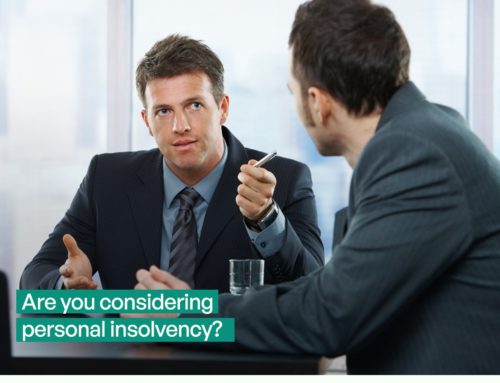If you are an owner or director of a limited company and are dealing with personal debt, you may think that your personal debt may impact your company. In most cases, this isn’t true and that’s because a limited company is treated as a separate legal entity.
Therefore, any debt you owe is not related to your limited company, i.e. there is limited liability for you personally. The same applies in reverse; any debt being carried by the limited company is not connected to your personal financial position.
However, there are some (rare) circumstances when your personal debt may affect your limited company; for example, if you signed a personal guarantee to secure credit for your company. This means you are personally responsible for that debt.
About a limited company
A limited company is a business model for a company that is considered a separate legal entity from the owners, investors, shareholders and directors. Any limited company in the UK must be ‘incorporated’ (registered) with Companies House, which allocates a unique number to the company.
There are two types of limited company – a public limited company and a private limited company. Only the former can sell shares of the business to the general public, but the latter can allocate shares to investors, who become shareholders in the business.
Currently, over 4.5 million limited companies are registered with Companies House, and more than 500,000 new limited companies are incorporated every year. Government figures show a 1.2% increase in the number of limited companies registered in just the first three months of 2022.
These figures demonstrate that a limited company is one of the most favoured business models and a key reason for this is that it limits the owners’ and investors’ personal liability. This means they are only personally responsible for the money they have invested in the company.
An extension of this is a limited company based on its shares. In this situation, liability is limited to just the unpaid share value. This means company investors and owners are protected should a severe disaster or event hit the business.
In general, limited companies are owned by their shareholders and their directors, including the CEO, are employees of the business. Therefore, any personal debt a director has is treated as entirely separate and therefore does not have an effect on the business’s finances.
About limited liability partnerships (LLPs)
In a traditional partnership, any personal debt carried by one or both of the partners will have an impact on the business. However, a limited liability partnership is set up in the same way a limited company is and means that liability is limited. For example, the international estate agent, Knight Frank, is an LLP and therefore, any personal debt held by the multiple partners does not affect the business’s finances.
How to resolve personal debt?
There are a variety of debt management and insolvency solutions that can help resolve personal debt. In most cases, talk to your creditors about your personal financial situation, and you may be able to reach an agreement, such as a monthly repayment that is in line with your income. However, if this isn’t possible, a debt management company can help you with any of the following personal debt solutions.
Debt Management Plan (DMP)
A DMP means you can repay your debts at a rate that is affordable to you. It is suitable for debts like store or credit cards, personal loans and overdrafts. The debt management company liaises with you and your creditors to agree on a payment plan that works for both parties. Once approved, you make your monthly payment to the debt management company, who subsequently distributes the funds to your creditors.
Debt Relief Order (DRO)
A DRO is more suitable if you are on a low income and have little in the way of assets or none at all. Again, a debt management company agrees on the arrangement between the parties and the debtor. Once the DRO is active, your debts are frozen with creditors for a period of 12 months. If there is no change in your personal financial circumstances by the end of this period, your debts are written off entirely.
Individual Voluntary Arrangement (IVA)
If your debts are significant but the amount you are able to pay back is low, an IVA could be the best option. An IVA:
- Lasts for a specific amount of time, i.e. 5 or 6 years.
- Enables you to pay back what you can afford, even at a low rate.
- Means any outstanding debt at the end of the IVA is written off entirely.
Once an IVA has been agreed upon and signed by both parties, it is legally binding on both parties.
Bankruptcy
Bankruptcy should always be considered a last resort, but if you have to enter this personal insolvency procedure:
- It will write off all the debts you owe, as long as you can prove the debt.
- Any assets you have will be seized, and the debt management company will use the proceeds to pay your creditors.
- Whilst it allows you to make a fresh start, it will have a negative impact on you and your personal financial circumstances for quite a long time. For example, you will find it almost impossible to get credit anywhere for a minimum period of 3 years.
Administration Order
This is similar to an IVA and is granted by a County Court. It is suitable if:
- Your level of debt is below £5,000.
- You are able to make regular payments toward your debts.
- You have a minimum of two debts, one of which is a Higher Court Judgement or CCJ against you.
Writing off debts
In exceptional circumstances, i.e. you have no income available, no savings and no assets, if you can prove this with your creditors and demonstrate that this position it’s not likely to improve in the future, you may be able to write off your debts.
Full and final settlement offer –
If you are not able to pay your debt in full but are able to make a substantial lump sum payment towards settling your debt, your creditors may accept your part-payment offer. If the creditor is in agreement, the remaining outstanding debt is written off. Alternatively, your creditor may allow you to make monthly payments over an agreed period of time. When the period comes to an end, the balance is written off.
If you are struggling with corporate or personal debt and unsure what the correct route is to deal with your creditors, the first step is to seek professional advice. Our highly experienced professionals at Leading are on hand to help with advice on managing personal and professional insolvency matters. Contact us today and discover how we can help you.


